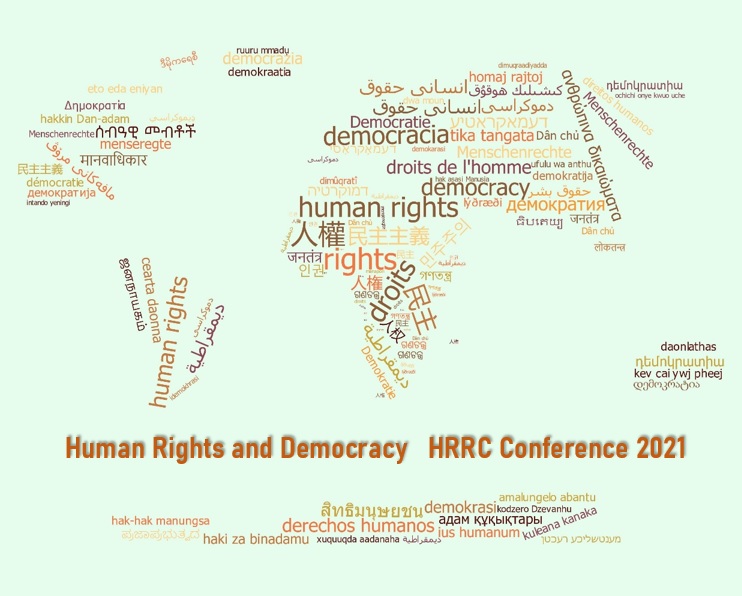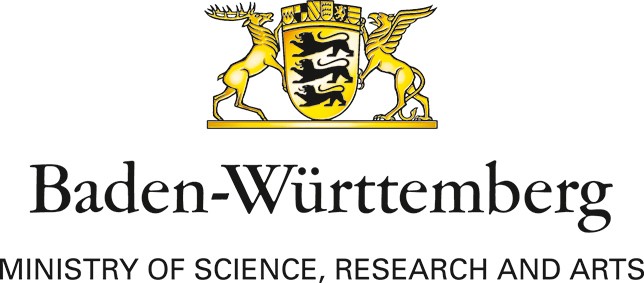HRRC Conference 2021
Human Rights and Democracy
Thursday, June 24, 2021 via Zoom
Welcome
9:00 am Connecticut / 15:00 Baden-Württemberg
- Co-Directors' Welcome: Sebastian Wogenstein, German Studies, University of Connecticut
- University of Freiburg/Freiburg Institute for Advanced Studies: President Kerstin Krieglstein
- Ministry of Science, Research and Arts of the State of Baden-Württemberg: Martina Diesing, Senior Program Officer, Unit for Internationalization
- State of Connecticut, Office of Global Affairs, University of Connecticut: Vice President for Global Affairs Daniel Weiner
- Consulate General of Germany, Boston: Consul General Nicole Menzenbach
9:15 am Connecticut / 15:15 Baden-Württemberg
Moderator: Bernd Kortmann, English, Director of the Freiburg Institute for Advanced Studies, University of Freiburg
Keynote: Human Rights, Discrimination, and Social Justice
Wilfried Hinsch, Chair for Practical Philosophy, University of Cologne
Abstract:
Received understandings of discrimination vacillate uneasily between conceptions based on individual rights and group-based conceptions with a focus on notions of social exclusion and identity. Both types of conceptions, though, fail to explain the peculiar wrong involved in unfair discrimination, which—it will be argued—is a wrong of distributive injustice. Moreover, right-based as well as group-based conceptions lead to a distorted picture of the social dynamics of discrimination. A practice conception of discrimination will be presented as a theoretically and practically superior alternative to both understandings on both counts.
10:15 am Connecticut / 16.15 Baden-Württemberg
Moderator: Karin Amos, Education, Vice President of Academic Affairs, University of Tübingen
How to democratize the human rights? A proposal from the Epistemologies of the South
Boaventura de Sousa Santos, Sociology of Law, Economics, University of Coimbra / University of Wisconsin at Madison
Abstract:
Human rights have a double genealogy, as an instrument of oppression and as an instrument of liberation. Based on the epistemologies of the south, I will try to indicate some ways of maximizing the liberation genealogy and nullifying the oppression genealogy.
Organized by the HRRC Working Group on Human Rights Education and Solidarity
11:00 am Connecticut / 17:00 Baden-Württemberg
Moderator: Dorothee Kimmich, German Literature, University of Tübingen
Democracy as a Human Right
Lewis Gordon, Philosophy, University of Connecticut
Abstract:
A human right by definition applies to all human beings. Oppression involves the disempowerment of groups of human beings. The structure of such an enterprise requires the expansion of power for some at the expense of others. The conditions for such a possibility are the combination of government (rule) and politics (actions through which governing is empowered with legitimacy). If human rights pertain to all, but the conditions of their implementation are in the hands of few, how can this be achieved without disempowerment of their political capacity to contribute to practices of legitimacy? This talk will explore this problem of the public dimensions of political responsibility by which the conditions of protecting human rights gain their legitimacy through the pressing question, in today’s conflicts between the privatization of power and the public obligation of it, the idea of democracy as a human right.
Organized by the HRRC Working Group on Philosophical Foundations of Human Rights
12:00 pm Connecticut / 18:00 Baden-Württemberg
Next steps for the HRRC
Katharina von Hammerstein, German Studies, Human Rights Institute, University of Connecticut
Break with an opportunity for informal conversation
12:30 pm Connecticut / 18:30 Baden-Württemberg
Moderator: Silja Vöneky, Public International Law, Vice Dean, Freiburg Institute for Advanced Studies, University of Freiburg
Artificial Intelligence and the Past, Present and Future of Democracy
Mathias Risse, Human Rights, Global Affairs and Philosophy, Director of the Carr Center for Human Rights Policy, John F. Kennedy School of Government, Harvard University
Abstract:
Located at the intersection of political philosophy, philosophy of technology and political history, this essay reflects on medium or long-term prospects and challenges for democracy that arise from AI, and does so in a historical perspective that reveals how critical a stage this is. Modern democracies involve structures for collective choice that periodically empower relatively few people to steer the social direction for everybody. As in all forms of governance, technology shapes how this unfolds. Specialized AI changes what philosophers of technology would call the materiality of democracy, not just in the sense that independent actors deploy different tools. AI changes how collective decision making unfolds and what its human participants are like (how they see themselves in relation to their environment, what relationships they have and how those are designed, and generally what form of human life can get realized). AI and democracy are not “natural allies” in any interesting sense: it will take active design choices and much political will for AI so serve democratic purposes.
Organized by the HRRC Working Group on Human Rights, Science and Technology
1:15 pm Connecticut / 19:15 Baden-Württemberg
Moderator: James Cavallaro, Director of the University Network for Human Rights; Wesleyan University; Yale University; University of Connecticut
Business Responsibilities for Human Rights: Democratic Challenges
Janne Mende, Max Planck Institute for Comparative Public Law and International Law, Heidelberg
Abstract:
Due to their rising agency and power in globalization and global governance, business enterprises are increasingly addressed as both violators and protectors of human rights. This challenges the human rights regime to call not only states to account. At the same time, one cannot treat enterprises as if they were states. Business enterprises are not democratically legitimated; their purpose is not the public interest. On the other hand, they are not just private actors either. Their activities are closely connected to questions of public interest. This talk therefore suggests situating enterprises between and beyond public and private: not simply blurring the two sides but constituting a distinct third. This allows developing new approaches of responsibility and democracy which take the current challenges to human rights into account: transcending the public-private divide but not dissolving it.
Organized by the HRRC Working Group on Human Rights and International Relations
2:00 pm Connecticut / 20:00 Baden-Württemberg
Moderator: Lia Börsch, Modern and Contemporary History, University of Tübingen
How to Communicate Human Rights in Times of Backlash? Communication Practices of the European and Inter-American Human Rights Regimes
Silvia Steininger, Max Planck Institute for Comparative Public Law and International Law, Heidelberg
Abstract:
How, why, and to whom are human rights courts communicating? In this talk, I will present a draft paper which investigates how the European and Inter-American human rights regimes have developed communication practices to create loyalty. I argue that communication departments exercise essential functions for human rights institutions, in particular by creating diffuse support for international courts among the general public and specialized stakeholders. By drawing on semi-structured interviews, the comparative analysis of the European and Inter-American human rights regime illustrates both the professionalization of communication actors and the evolution of specific communication strategies in times of backlash.
Organized by the Graduate Human Rights Research Working Group
2:30 pm Connecticut / 20:30 Baden-Württemberg
Moderator: Tobias Lebens, German Studies, University of Tübingen
Do we Need "Neurorights" as New Human Rights?
Nora Hertz, Law, University of Freiburg
Abstract:
Progress in neuroscience and artificial intelligence provides unprecedented insights into the human brain. There are increasing possibilities to influence mental processes directly (e.g. through medication or devices), but also indirectly (e.g. nudging or microtargeting). These developments challenge the idea of free will and human agency, which are necessary conditions for a functioning democracy, and thus challenge democracy itself. The proponents of “neurorights” argue in favour of the introduction of new rights to protect mental integrity and free will. This presentation will discuss whether the introduction of “neurorights” is necessary or whether the existing human rights framework provides sufficient protection.
Organized by the Graduate Human Rights Research Working Group
3:00 pm Connecticut / 21:00 Baden-Württemberg
Closing Remarks
Human Rights and Democracy



